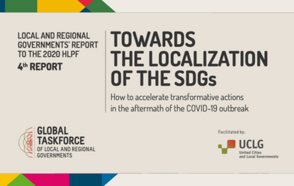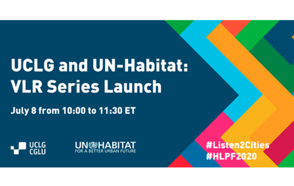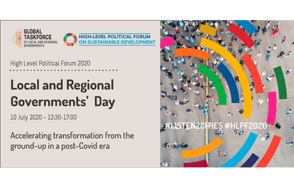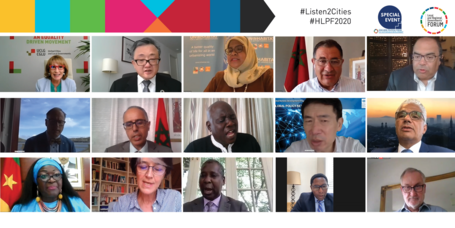
The Third Local and Regional Governments’ Forum, co-organized by the Global Taskforce and UN-DESA, UN-Habitat, UNDP, and the Executive Office of the UN Secretary General, took place within the framework of the 2020 High-Level Political Forum. With over 30 speakers, including Tijjani Muhammad Bande, President of the 74th UN General Assembly; Undersecretary General for Economic and Social Affairs of the UN Liu Zhenmin; Undersecretary General of the UN and Executive Director of UN-Habitat Maimunah Mohd. Sharif; Mahmoud Mohieldin, Special Envoy of the Secretary-General on Financing the 2030 Agenda for Sustainable Development, representatives from national governments and local and regional governments. The session counted on over 300 participants.
Under the title “The Decade of Action - bolstering change from the ground-up”, the LRG Forum debated the importance of basic service delivery, the need for a renewed multilevel territorial governance in the midst of the pandemic, and how to carry out a full collaboration among spheres of government to build back better after the outbreak taking into account that the transformative roadmap for local and regional governments remains the 2030 Agenda and its SDGs.
Opening the event, Liu Zhenmin, UN Under-Secretary-General for Economic and Social Affairs, argued for the need to ensure that we don’t backslide the progress made on the SDGs, which can hamper the resilience of our communities. Maimunah Mohd Sharif, UN-Habitat Executive Director, underscored the need for innovative financing mechanisms and investing in human capital, and highlighted the “unique legitimacy” of LRGs to bring together their communities, hailing them as the key players upon which the future will depend.

Mahmoud Mohieldin, Special Envoy of the UN Secretary-General on Financing the 2030 Agenda for Sustainable Development, highlighted the need for a new “DNA” for an called for a multifaceted approach to build on urban-rural linkages and develop innovative financing mechanisms.
UCLG President Mohamed Boudra, Mayor of Al Hoceima and President of the Moroccan Association of Mayors, addressed the interdependence of sanitary systems and public service delivery, calling on national development and recovery plans integrate plans to localize the agendas for basic public services and local community action and further reminded of the importance of the Towards the Localization of the SDGs report as a critical instrument for our advocacy.
“The sacrifices of our communities cannot go unnoticed. Our post-crisis resilience and the sustainability of the planet are at stake for the decade of action.” Mohamed Boudra, President of UCLG
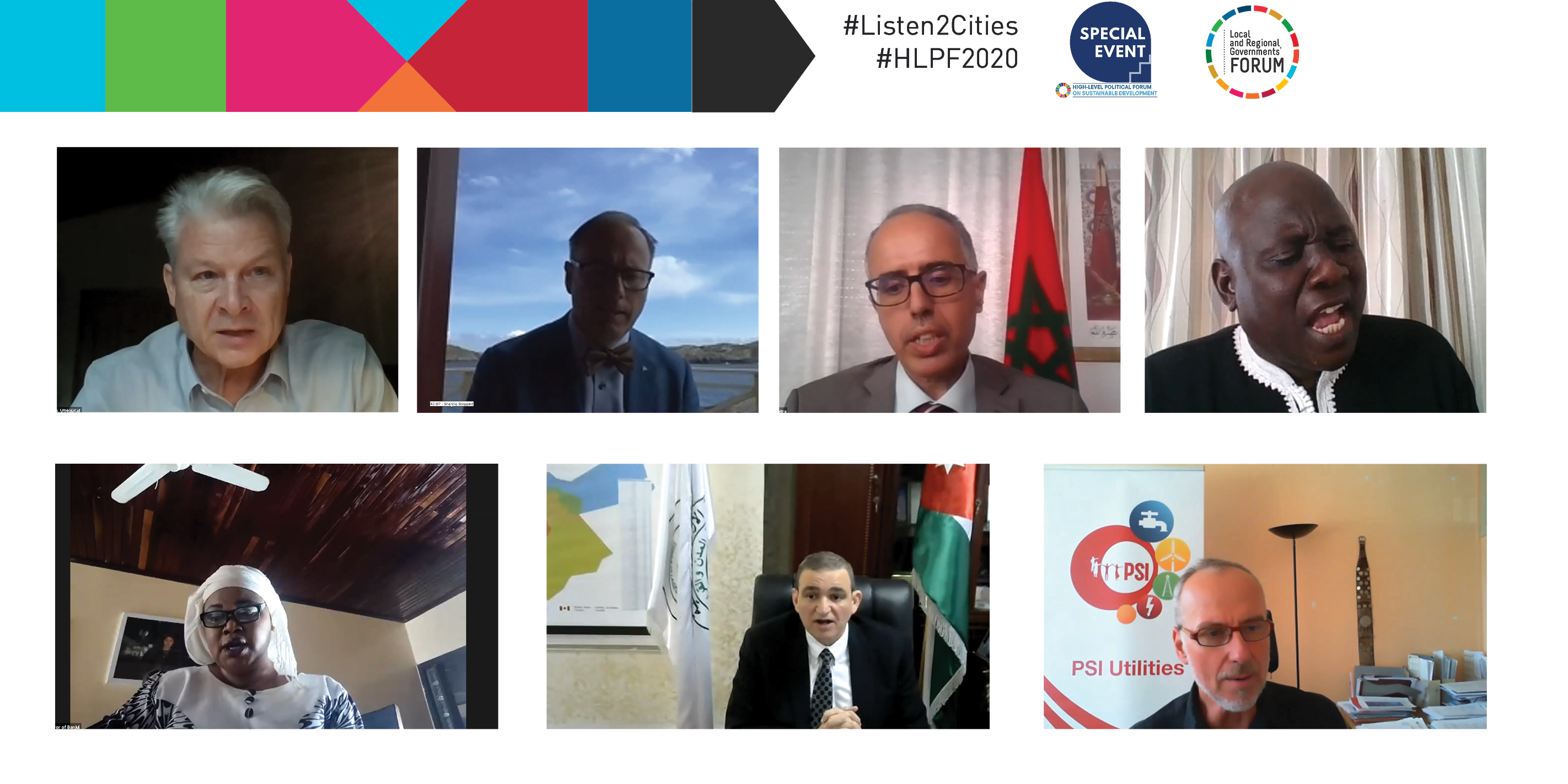
The panel on “delivering universal basic services” was moderated by Raf Tuts, Director of Global Solutions Division, UN-Habitat- Magnus Berntsson, President of the Assembly of European Regions, commended the actions of local and regional governments during the pandemic, and argued that the recovery plans needed to include the environmental aspect and the SDGs related to climate and nature. Abdessamad Sekkal, President of the Rabat-Salé-Kénitra Regional Council and President of ORU-FOGAR, argued for the importance of subsidiarity and citizens’ participation in decision making for SDG implementation in the post-COVID-19 era.
Rohey Malick Lowe, Mayor of Banjul, spoke about major challenges related to the COVID-19 in Africa, highlighting the importance of sensitizing people to the emergency of the COVID-19 pandemic and of creating ownership of the Sustainable Development Goals in local communities. Rev. Mpho Moruakgomo Chair, Commonwealth Local Government Forum (CLGF), mentioned that the new normality needed to include decentralization to strengthen basic services, and argued for the transformation of our consumption models to ensure a recovery mindful of local communities.
Osama Al Azzam, Director General, Cities and Villages Development Bank, and Acting Secretary General, Ministry of Local Administration, Jordan, highlighted how Jordan is already working to ensure a more resilient recovery through a collaboration with solar farms. The increased energy demands, he argued, need to be met through sustainable means.
The panel was closed by David Boys, Deputy General Secretary, Public Services International, who laid out the need to reform our current systems. This reform, he argued, needs to include all stakeholders in order strengthen our democracies, and must be done through a reform of our financial and tax systems that also addresses economic inequality and adequately funds basic services
The first panel, on Multilevel Territorial Governance and Sustainable Financing was moderated by Haoliang Xu, Director, Bureau for Policy and Programme Support, UNDP, who called for multilevel co-creation in order to achieve the universal agendas. This called for all levels of governments to be involved, in particular in the monitoring and reporting process and through Voluntary Local Reviews.
Thembisile Nkadimeng, Mayor of Polokwane, Copresident of UCLG, and President of the South African Local Government Association (SALGA), called on all spheres of government to carry out investments for a greener future. The multilevel governance system, she argued, is critical to support and empower Local and Regional Governments to maintain their commitments with the universal development Agendas.
“Our efforts must include investments for a more inclusive and greener future, and this is where the multilateral system can support multi-level governance and empower LRGs to continue the commitment with global agreements. Thembisile Nkadimeng, Mayor of Polokwane, Copresident of UCLG, and President of SALGA
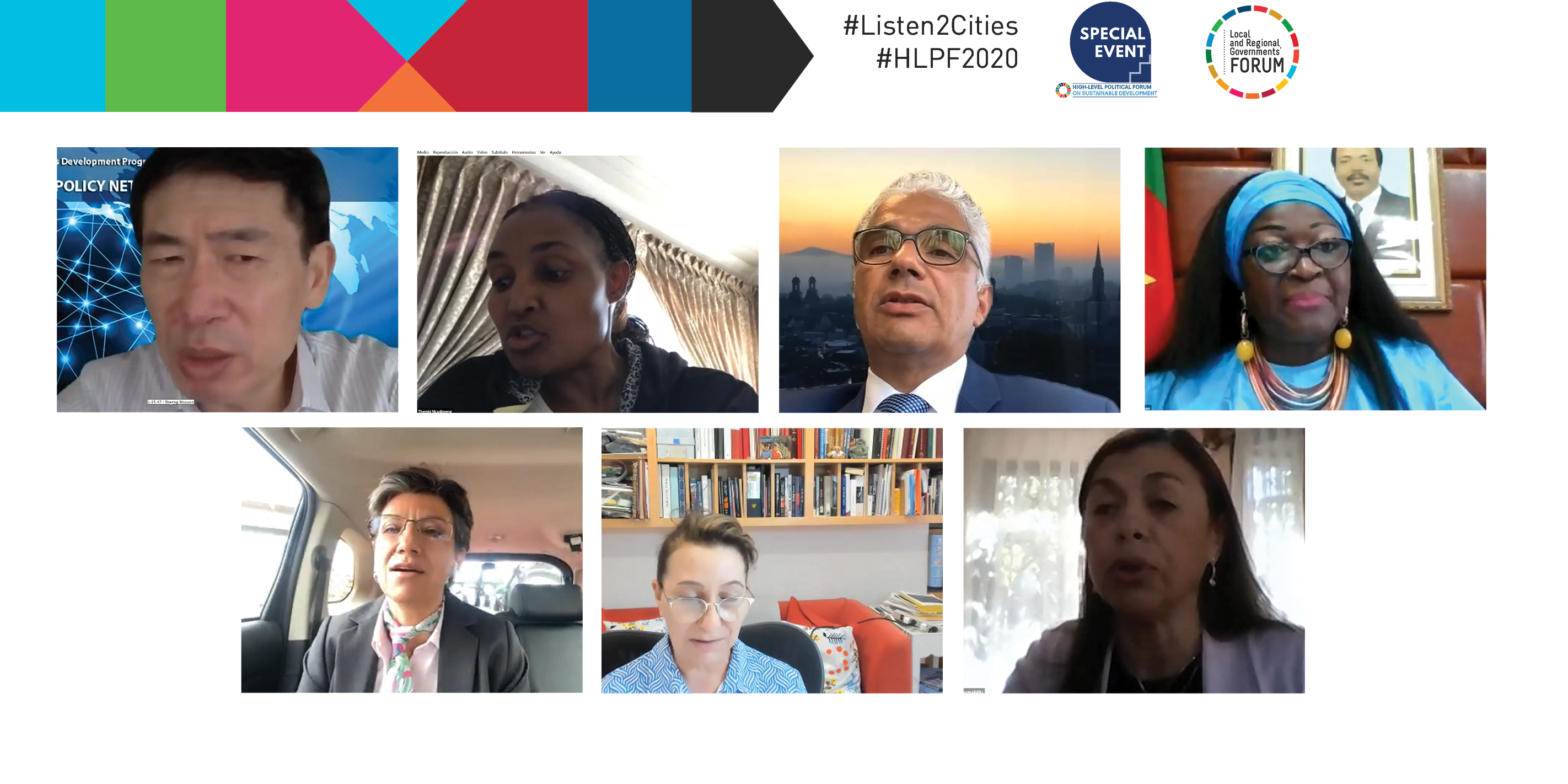
The call for multilevel collaboration to be extended was echoed by Ashok Sridharan, Mayor of Bonn, and President of ICLEI- Local Governments for Sustainability, who urged LRG to present ambitious commitments during the 26th session of the Conference of the Parties to the UN Convention on Climate Change (UNFCCC) in Glasgow, as now is the time for action.
Claudia López, Mayor of Bogotá, argued for strengthening the connections between local governments to ensure that they receive the adequate financial and technical assistance to ensure green and sustainable, recoveries.
Linda Bilmes, Harvard Kennedy School, and UN Committee of Experts on Public Administration (CEPA), highlighted that most local and regional governments are on the path to integrate the SDGs into their finance, including through participatory budgeting, and called on national governments and financing institutions to provide direct assistance to spending on basic services.
Célestine Ketcha Courtès, Minister of Housing and Urban Development, Cameroon, called for strong synergies between local and national governments, development partners, and the UN if we are to build back better and rethink sustainable development.
María Soledad Cisternas Reyes, Special Envoy of the UN Secretary-General on Disability and Accessibility, highlighted the opportunity that we are facing to ensure accessibility is a cross-cutting issue in the response to COVID-19. More accessibility, she stated, means less poverty.
The panel on “building back better” was moderated by Elliott Harris, UN Assistant Secretary-General for Economic Development and Chief Economist, highlighted the Sustainable Development Goals as the framework for “building back better” better responding to the needs of our environment, economies, and societies. Wim Dries, Mayor of Genk and President, Association of Flemish Cities and Municipalities, provided the “three” pillars that need to be considered to build back better; policies that are sustainable locally and globally; local and regional governments involved in the post-COVID19 recovery; and partnerships and SDG 17 as the key.
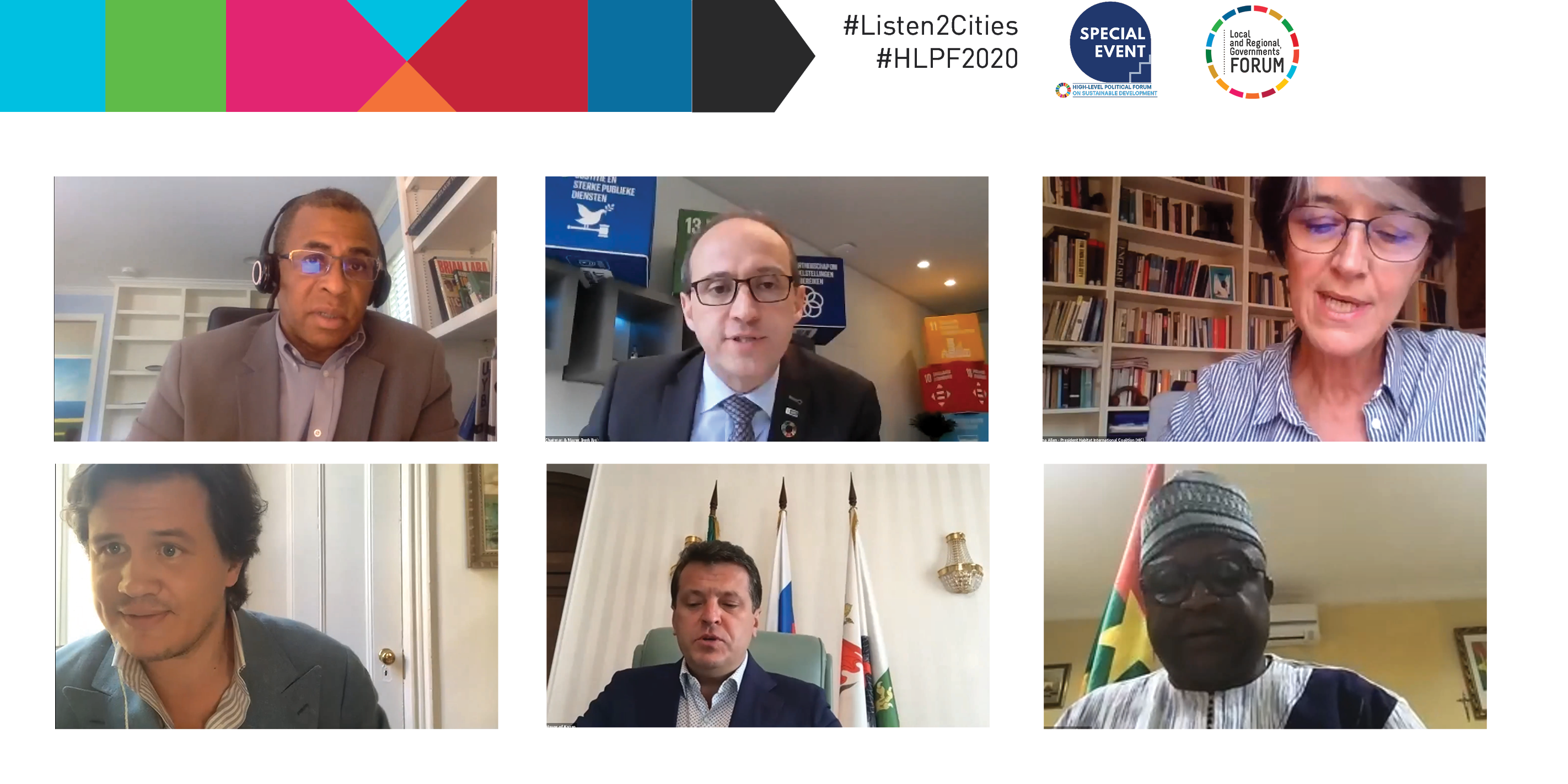
Adriana Allen, President, Habitat International Coalition, highlighted how the pandemic had shed light on existing inequalities, and that “building back better” had to, necessarily, work to de-commodify public resources and make them accessible to all people to truly build more inclusive societies
Andrew Wilson, Permanent Observer for the International Chamber of Commerce (ICC) to the UN, said the key takeaway from the COVID-19 crisis is that local solutions are of great value in the recovery, and that economic and social systems must build resilience in the future.
Ilsur Metshin, Mayor of Kazan, and Chair of the UN Advisory Committee of Local Authorities (UNACLA), said the pandemic is showing us the important upscale local action. Decentralized cooperation at the local level, he argued, is the very key to fight global challenges.
“We are all going through difficult times and LRGs are at the forefront of the covid battle. For all of us, the unexpected outbreak of the pandemic is a chance for us to change the way in which we live.” Ilsur Metshin, Mayor of Kazan, Chair of UNACLA
Armand Béouindé, Mayor of Ouagadougou and Vice President of UCLG for Africa, argued that it is through dialogues, exchanges, and cooperation that we will be able to develop new cities and new economies that can fulfill the needs of our territories

Jean Pierre Elong Mbassi, UCLG Africa Secretary-General, stated how bringing local and regional governments to the table is one critical way in which the UN can show progress, at its 75th anniversary.
Greg Munro, Secretary-General, CLGF, argued that having local and regional governments at the decision-making table is a way to legitimize the system, and a critical way to improve trust among international institutions and citizens.
Tijjani Muhammad Bande, President of the 74th UN General Assembly, opened the Closing Ceremony by stating that the recovery and the achievement of the SDGs are not tasks for any stakeholder alone. Partnerships between spheres of government, he added, will be key to carry out basic services.
Selwin Hart, Special Adviser to the Secretary-General and Assistant Secretary-General for Climate Action, highlighted the importance of LRG leadership as drivers for transformation, and called on them to serve as advocates for the six climate-related actions to shape the COVID-19 recovery.
Antonio de Mello, Coordinator of International Relations, Rio de Janeiro City Hall, Brazil, argued for a greener and sustainable recovery, and called on international institutions and development banks to provide credit lines for countries that are currently suffering through the worst effects of the pandemic.
Closing the event, Emilia Saiz, UCLG Secretary General, underscored the need for a more inclusive multilateral system to advance post-COVID-19 recovery efforts and the 2030 Agenda, urging participants to provide their action commitments to the UN to ensure local voices for the SDGs and the recovery are heard.
- Read the Fourth “Towards the localization of the SDGs” report here.
- Watch the session again here.
- Read Statement of to the High-Level Political Forum.
- Read the IISD coverage of the Local and Regional Governments' Forum
- Read the IISD Bulletin on the Local and Regional Governments' Forum











